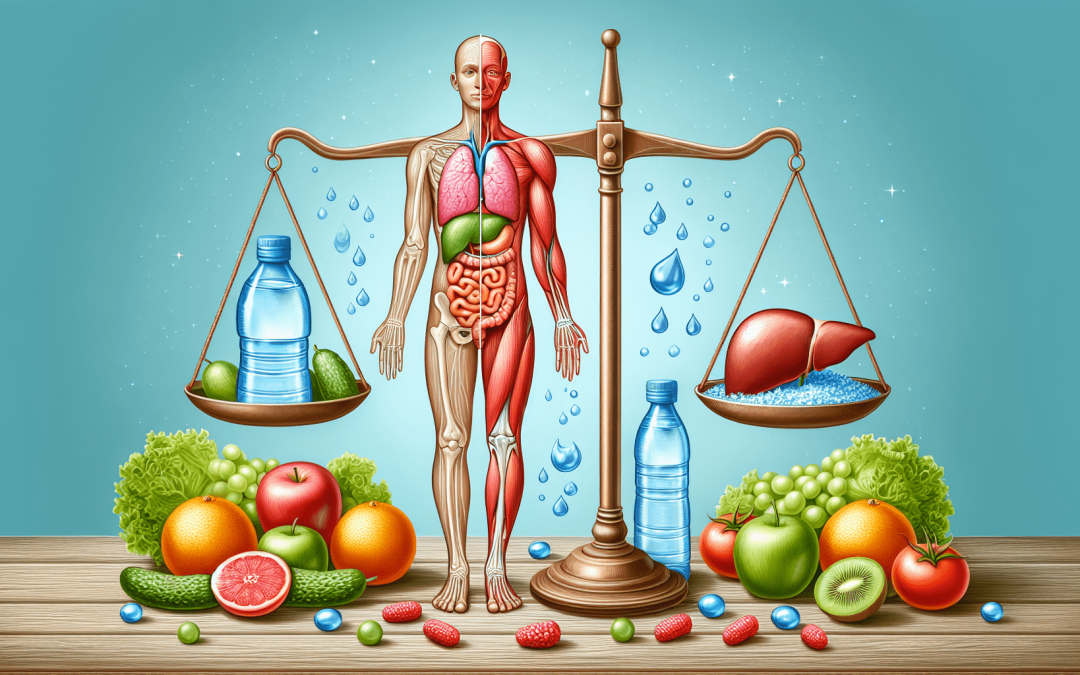Have you ever wondered if detoxing is necessary for your body? Well, the answer is no! Your body has its own natural detoxification process that works efficiently to eliminate toxins and waste. Detox diets that involve juice cleanses or restrictive eating can actually be dangerous and may not be effective for weight loss. Instead, focus on making healthy lifestyle choices like caring for your skin, consuming prebiotics, eating anti-inflammatory foods, getting enough sleep, exercising regularly, staying hydrated, and reducing alcohol intake. These actions can support your body’s natural detox processes and promote overall health. Remember to consult with a healthcare provider before trying any detox or cleanse, as they may have potential risks and side effects.

Detoxing is not necessary
Detoxing has become a popular trend in recent years, with many people turning to juice cleanses and restrictive eating plans in an effort to rid their bodies of toxins. However, the truth is that detoxing is not necessary. The human body is equipped with natural detoxification processes that work efficiently to eliminate waste and toxins from the body.
The body naturally detoxifies itself
Our bodies are designed to naturally detoxify themselves on a daily basis. The liver, kidneys, skin, and lungs are all organs that play a crucial role in the body’s detoxification processes. These organs work together to break down and eliminate waste products, toxins, and other harmful substances from the body.
The liver is often referred to as the body’s primary detoxification organ. It filters toxins from the blood and converts them into less harmful substances that can be eliminated from the body. The kidneys also play a vital role in detoxification by filtering waste products and excess fluids from the blood, which are then excreted as urine.
The skin is the largest organ in the body and plays an important role in detoxification through sweat production. Sweating helps to eliminate toxins from the body and keep the skin healthy. The lungs also contribute to detoxification by removing toxins and waste gases through respiration.
Detox diets can be dangerous
Detox diets that involve juice cleanses or restrictive eating can be dangerous and may do more harm than good. These diets often severely restrict caloric intake and may lead to nutrient deficiencies, muscle loss, and a weakened immune system. They can also cause metabolic imbalances and have negative impacts on overall health.
Furthermore, the weight loss achieved through detox diets is often temporary and primarily due to loss of water weight and muscle mass, rather than fat loss. Once the individual resumes normal eating patterns, the weight is likely to be regained.
Limited evidence on detoxes for weight loss
There is limited scientific evidence to support the effectiveness of detoxes for weight loss. While some people may experience initial weight loss on a detox diet, the long-term sustainability and health benefits of these diets are questionable. It is important to focus on making sustainable, healthy lifestyle changes rather than relying on short-term detoxes for weight loss.
Natural detoxification organs
Understanding the natural detoxification organs in our body can help us appreciate the amazing way in which our body naturally eliminates toxins on its own.
The liver
The liver is often referred to as the body’s detoxification powerhouse. It plays a crucial role in detoxification by filtering toxins from the blood and metabolizing them into less harmful substances. The liver also produces bile, which aids in the digestion and absorption of fats.
To keep your liver healthy and functioning optimally, it is important to consume a balanced diet rich in fruits, vegetables, whole grains, and lean proteins. Avoiding excessive alcohol consumption and drugs can also help to protect and support your liver’s detoxification processes.
The kidneys
The kidneys are another important organ involved in detoxification. They filter waste products and excess fluids from the blood, which are then excreted as urine. The kidneys also help to regulate blood pressure and maintain electrolyte balance in the body.
To support your kidney health and natural detoxification processes, it is important to drink an adequate amount of water daily. Staying hydrated helps to flush out toxins and waste products from the kidneys. Additionally, maintaining a healthy blood pressure and managing chronic conditions such as diabetes can also contribute to kidney health.
The skin
The skin is not only the body’s largest organ but also plays a significant role in detoxification. Sweating helps to eliminate toxins and waste products from the body. Regularly caring for your skin through proper cleansing and moisturizing can support its natural detoxification processes.
Saunas and steam rooms can also be beneficial for detoxification through sweat production. However, it is important to stay hydrated when using these facilities to avoid dehydration.
The lungs
The lungs are responsible for removing waste gases such as carbon dioxide from the body during respiration. Deep breathing exercises can help to support the lungs’ natural detoxification processes. These exercises can also help in reducing stress and increasing oxygen intake, which has numerous health benefits.
Breathing in clean air and avoiding exposure to pollutants like cigarette smoke and air pollution can also help to support the health and function of your lungs.
Lifestyle changes to support natural detox processes
While our bodies are naturally equipped to handle detoxification, there are several lifestyle changes that we can make to support and enhance these processes.
Skincare
Proper skincare not only helps to maintain the health and appearance of our skin but can also support its natural detoxification processes. Regularly cleansing and moisturizing your skin helps to remove impurities and keep it hydrated. Avoiding harsh chemicals and using natural skincare products can also be beneficial for your skin’s health.
Consuming prebiotics
Consuming foods that are rich in prebiotics can help to support the growth of beneficial bacteria in the gut. These beneficial bacteria play a key role in the detoxification processes of the body. Foods such as garlic, onions, bananas, asparagus, and oats are all good sources of prebiotics.
Eating anti-inflammatory foods
Chronic inflammation in the body can hinder detoxification processes. Incorporating anti-inflammatory foods into your diet, such as fruits, vegetables, fatty fish, nuts, and seeds, can help to reduce inflammation and support the body’s natural detox processes.
Getting enough sleep
Adequate sleep is essential for overall health, including detoxification processes. During sleep, the body repairs and regenerates cells, which is crucial for detoxification. Aim for 7-9 hours of quality sleep every night to support your body’s natural detox processes.
Exercising regularly
Regular exercise has numerous health benefits, including supporting natural detox processes. Exercise stimulates blood circulation and the lymphatic system, which helps to remove toxins from the body. Engage in activities that you enjoy and aim for at least 150 minutes of moderate-intensity exercise per week.
Staying hydrated
Drinking an adequate amount of water is essential for supporting natural detox processes. Water helps to flush out toxins and waste products from the body. Aim to drink at least 8 cups of water per day, and adjust your intake based on activity level and climate.
Reducing alcohol intake
Excessive alcohol consumption can put a strain on the liver and hinder its ability to detoxify the body. Limiting alcohol intake or avoiding it altogether can help to support natural detox processes and protect the liver.
Potential risks and side effects of detoxes
While natural detoxification processes are safe and effective, detoxes that involve restrictive eating or extreme measures can have potential risks and side effects.
Dehydration
Many detoxes encourage increased water intake or the consumption of diuretic beverages to flush out toxins. However, excessive fluid intake without balancing electrolytes can lead to dehydration. It is important to maintain a proper balance of fluids and electrolytes to avoid dehydration during a detox.
Nutrient deficiencies
Detox diets often restrict caloric intake and eliminate certain food groups, which can lead to nutrient deficiencies. Essential nutrients like vitamins, minerals, and macronutrients are necessary for the proper functioning of the body. Severe calorie restriction can also lead to muscle loss and a weakened immune system.
Gastrointestinal issues
Some detox diets may result in gastrointestinal issues such as diarrhea, constipation, or bloating. These issues can be caused by sudden dietary changes, the elimination of specific food groups, or the consumption of certain detox supplements or laxatives. These symptoms can be uncomfortable and may disrupt the natural balance of gut bacteria.

Consultation with healthcare provider
Before embarking on a detox or cleanse, it is important to consult with a healthcare provider. They can assess your individual health needs and provide guidance on whether a detox is appropriate for you. They can also help monitor your progress and address any potential risks or side effects that may arise during the detox process.
A healthcare provider can also help you create a personalized plan to support your body’s natural detox processes through lifestyle changes, dietary adjustments, and appropriate supplementation if necessary.
Detoxes and cleanses are not necessary
Despite the growing popularity of detoxes and cleanses, they are not necessary for maintaining good health. Instead of relying on such methods, it is more beneficial to focus on making sustainable, healthy lifestyle choices that support overall health and the body’s natural detoxification processes.
Focus on healthy lifestyle choices
Making healthy lifestyle choices can have a significant impact on your overall health and wellbeing. Prioritize a balanced diet rich in fruits, vegetables, whole grains, and lean proteins. Engage in regular physical activity that you enjoy, aiming for at least 150 minutes per week. Get ample sleep, stay hydrated, and manage stress effectively.
Support overall health
Maintaining overall health is key to supporting the body’s natural detoxification processes. By taking care of your body through a healthy lifestyle, you ensure that your liver, kidneys, skin, and lungs are functioning optimally and effectively eliminating waste and toxins from your body.
Remember, detoxification is a natural process that your body is equipped to handle. By focusing on supporting your body’s natural detox processes through healthy lifestyle choices, you can maintain good health and vitality.









